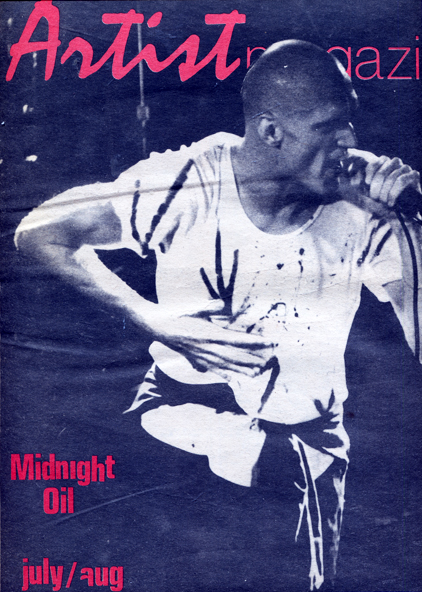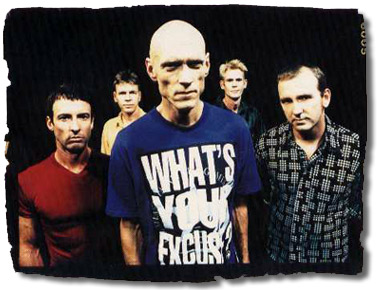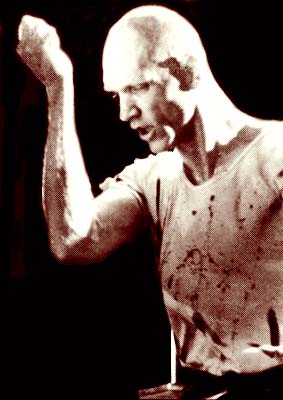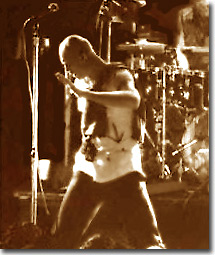
| Search JoyZine with Google Site Search! |
|
Midnight Oil interview by Joy Williams
I wait, along with a few other insiders—like the infamous Zoë—while an interview is filmed for TV's Channel 5 and then while Tom gets his turn for the San Francisco Chronicle's "Pink Section," the entertainment Bible for the Bay Area. Finally, it's my turn but sound check drives us next door to the Stuffed Bagel, where we discuss, over too many cups of coffee, just what Midnight Oil is all about. I'm curious, are these guys for real or are they just mouthing concern? It's happens, you know… Judge for yourself from the exchange below, but first let me fill you in on the body language. Peter Garrett is tall, yes, but I've met quite a few men just as tall or taller. But he is a particularly imposing presence, simultaneously overwhelming in an almost threatening way, and gentle. On stage, the fire and passion surge through his body, causing him to lurch dramatically about the stage and fairly charging the air about him with electricity. Off stage, he is quiet, unassuming, polite and self-assuredly committed. To Garret, his position against injustice is simply the only way to be. He is what Americans call "a bleeding heart liberal. " So, I ask him straight up: "Do you really, truly still believe in all this caring about the poor and world peace and all that?" PETER: (laughing) Yes…. That's exactly right and, I don't know really…. You mean, why am I still? Why haven't I become cynically disillusioned and sold out and all that stuff? Q: Yes. PETER: Well, I think partly because of being in a band like Midnight Oil, where we did set out with pretty high ideas at the beginning of our careers. They didn't seem like high ideals. Some of them just seemed like common sense. People saw them as ideas, but I think the interesting thing about that was that people also saw them as things a band couldn't do, that these were ideals a band couldn't aspire to…. Q: …and still make it. PETER: Yeah, whereas we've done it and because we've done it, I figure anyone can. I believe that strongly. Q: In the '60s there were bands that addressed social issues and that was accepted, but today it's just so different. I mean, the great leveling force has been at work here for a while now, and it's very unfashionable.… PETER: That's right, extraordinarily unfashionable. Q: And yet, it obviously hasn't stopped you.
PETER: The fact is, fashion hasn't had much to do with this either, which would mean that we haven't been that concerned with how we've looked or how we've sounded at any particular time. (And that's] because we've always existed to complement ourselves and our relationship in the band, just as musicians and performers, and maybe some of the peripheral shit that was going on that tends to influence one, influenced us a little less. We came out of a very acute, particular area and we came through with quite a strange way of doing things. We all just seem to be similar, just sort of drifted together. I don't think that the subject matter that we sing about is particularly unique…. I don't ever find that there is anything we're singing that is out of the ordinary. To me, it's quite normal stuff. Q: Theoretically, yes, but as far as rock bands are concerned…. PETER: Yeah, but rock bands out there are disappearing. We're in here for the moment. They're so concerned with… you know…. Q: "Do I have a bullet on the charts?" PETER: (laughing) Yeah, all that stuff. They just want to sell. There are exceptions all along the line. I've got good friends in the business as well, but I think that rock has become so heavily corporatized and so market oriented. And it's growing, it's getting larger. Q: Do you see this business system standing in the way of artists? PETER: It must, by definition. To a performer or to a songwriter or to an artist his art is a very valuable, cherished thing, which maybe it has taken him years to develop. In the business world, it's a commodity. Those two things are at opposite ends of the scale. Because we don't like looking at our music as a commodity we've always tried to treasure it and protect it wherever we go. Q: Well, you were over triple platinum in Australia and you're on tour here in the States, but you always took a different route. You didn't try to play the game exactly, and it's interesting that you were able to surmount….
PETER: I think we were lucky because we developed such a strong rapport with our audience, and people were fed up with the game, anyway. The audience (was) fed up with the game as well, you know. There (are) not that many other (areas) where you can determine exactly what it is you want to do and how you want to do it. But you can. If you choose to start in an R&R band, you can—at least to the point where people are willing to pay to come and hear you. That will keep you alive. And that's the secrete of why we're still around and not either in other bands or bitter and frustrated at never having made it in our own way. Q: You wanted to be a lawyer and I assume you didn't want to be a corporate lawyer: PETER: No, I was going to go up and defend the poor. Q: And you're still just doing something that you view has purpose, something that you believe in and that you want to get out there. PETER: Yeah, and we want to figure out what it is that makes people want to be different. Q: Indeed! Where did you come from in Australia? PETER: Well, it's all standard, really. I'm a middle class boy from a middle class suburb from a middle class city in a middle class country. Actually, I'm from Sydney. I suppose it has to do with wanting to be your own person, wanting to sort of do things in your own way. You've got this enormous country, a lot of it is desert. We just had a 5-year drought. You've got 5-6 million people stuck on this little East Coast area. We dig up our iron and ore there, and we dig up uranium and we plow our fields and shear our sheep, and that's about all we do. Q: Oh, no, you drink beer…. PETER: We did drink lots of beer. I'm not anti-Australian. I love that country very much. Otherwise, I wouldn't live there. It's my home and all that. It's young, and yet change is moving so quickly. Q: Sort of like adolescence. PETER: Yes, very much so. But it's far more relaxed. Q: Do you think it's so relaxed that it also doesn't pay any attention to its problems? PETER: I think it has the problem that the politicians don't really know what to do about its problems. Q: Does anyone? PETER: Well, I think that certain people do. They don't have to be politicians, really. It's also a very open place, the sky is open. There's lots of space and room to move there. That's an ideal condition for man, and that makes people friendlier and more relaxed and less concerned, probably. Q: On stage, the Oils are so very different than, say, Mental As Anything…
PETER: Yeah, well, I think they're really Australian. The Mentals are a very wry band, whereas the Oils are sort of very impassioned and serious. It's a difference in personalities. Q: Off stage you don't seem all that different. PETER: Well, no. We're from the same area and we're the same age and the Mentals and the Oils came up together as bands, really. We used to play with each other quite a bit, so in that sense we're close. But our concerns are different. Q: Is it really more a reflection of what's going on in Australia? PETER: No, I think we're the only people (there] writing songs and dealing with those sorts of things. Q: You must have touched a chord, though, or you wouldn't be that hugely popular. PETER: Well, I think it's because we're the only ones who are doing songs that have got something to do with those things that have never been addressed to the kids. There wasn't a tradition of student leaders, there wasn't a radical clique. I'm told that in Australia through the Seventies, once Vietnam came and went, Aussie radical bands all disappeared completely. Q: Where do you see it going from here? PETER: No idea, really. No idea. As far as immediate plans go, we plan to go to Europe and do some peace concerts. We want to play in Leningrad (St Petersburg]. Which would be this year's goal, to go and play on the other side of the Iron Curtain. I think that we can probably back down the Iron Curtain through music. The people over there see really keen to have bands. I don’t think we'll have any large problems with that. We're going to do an album in Japan, probably, because most of us haven't been there. It's a close neighbor to Australia and we don't know much about it. It's got a very vast technology and I think we just have to get a feel for that sort of society, a little bit. It will be a good stimulus, because it's too difficult to make an album at home now. At home there are too many distractions and diversions. Too much of an expectation about what we are as a band. Q: As I said earlier, you seemed to want to go aside from the whole system. You wouldn't show up at Countdown because you didn't feel they treated musicians right. PETER: Yes, we just do our thing completely separately, and just play and put out our records. Q: Playing in the clubs is supposed to be really tough. PETER: Yes, they are pretty rough… not all of them, but pretty rough. They're not really all that disposed to giving musicians a lift. We feel like we're forcing music on people there. But once they decide they like it, they like to hang onto you. Q: Well, that's supposed to build up a lot of Australian bands. Their stage presence.… PETER: It does, it does! It makes your stage presence very tough. It makes your band really strong. I mean, bands in England will make records before they ever play a live show. We did probably 200 shows before we ever went into a recording studio. Q: If Midnight Oil came to an end, would you go back to law? Do you want to continue fighting for your ideals? PETER: I think you'd better try and do that. Q: It'd probably be a lot better world if more people did actually live by their ideals. PETER: This band can help provide a rallying point for people. Most people find it very difficult to move on their own, make a stand on their own. We see ourselves as a band that goes about writing songs about things that we know other people maybe have a concern about. And we're mirroring that concern. You don't discover that you're horrified of that nuclear round you realize it when you think about it. Q: You can still serve that purpose as a focal point. PETER: Music does serve that purpose, and I wish a lot more musicians would write about those things. |



